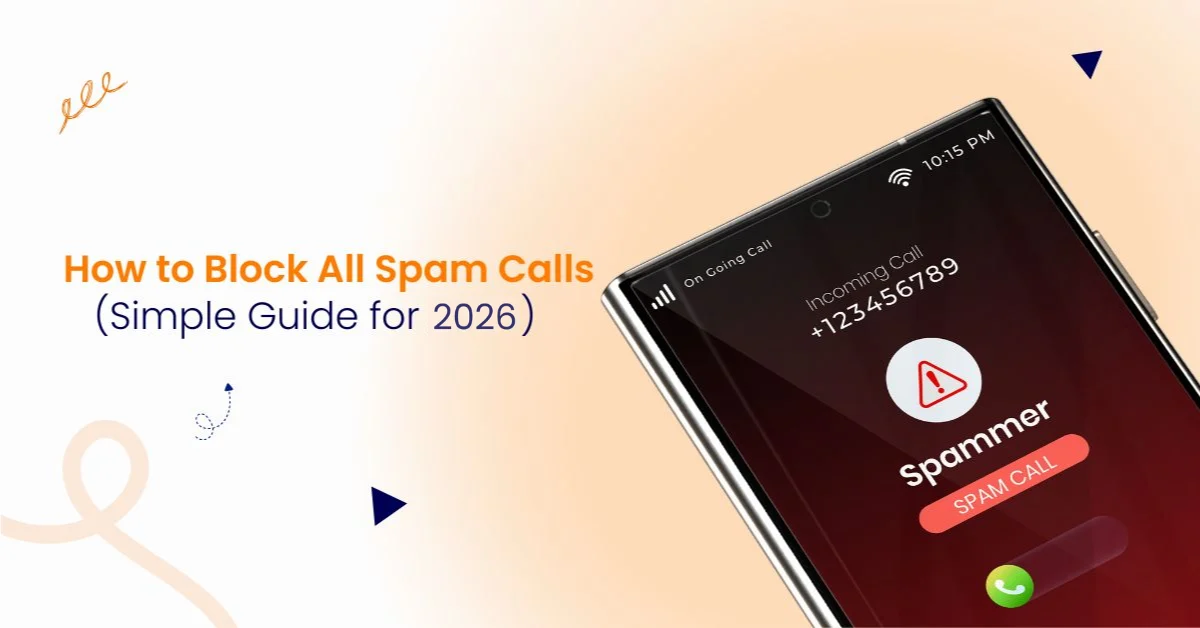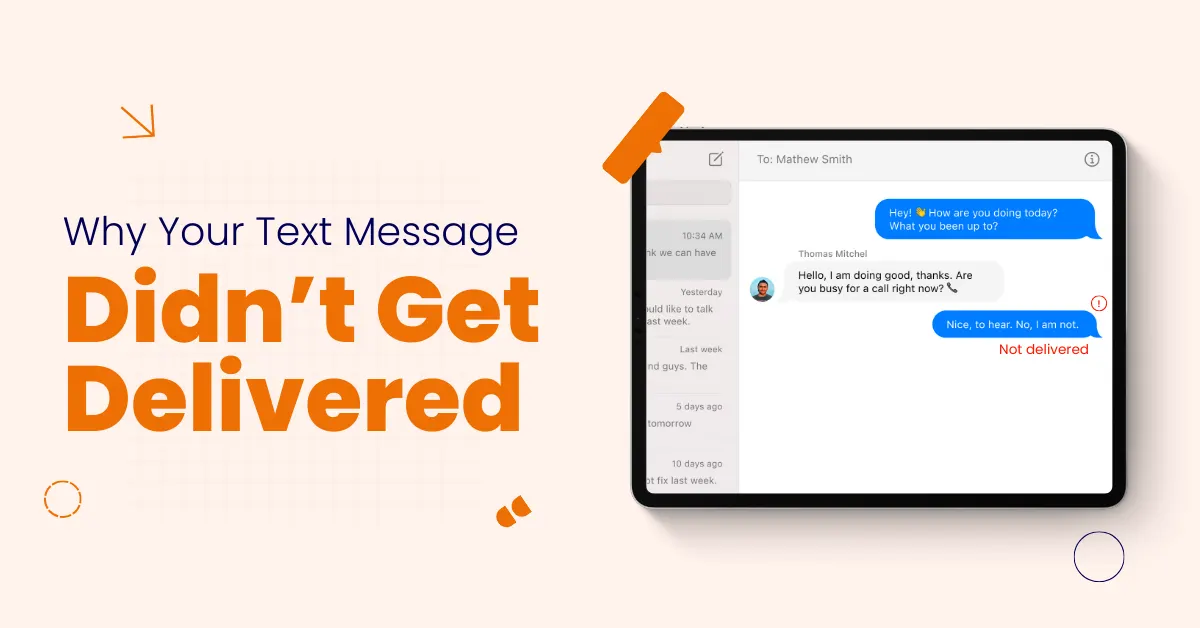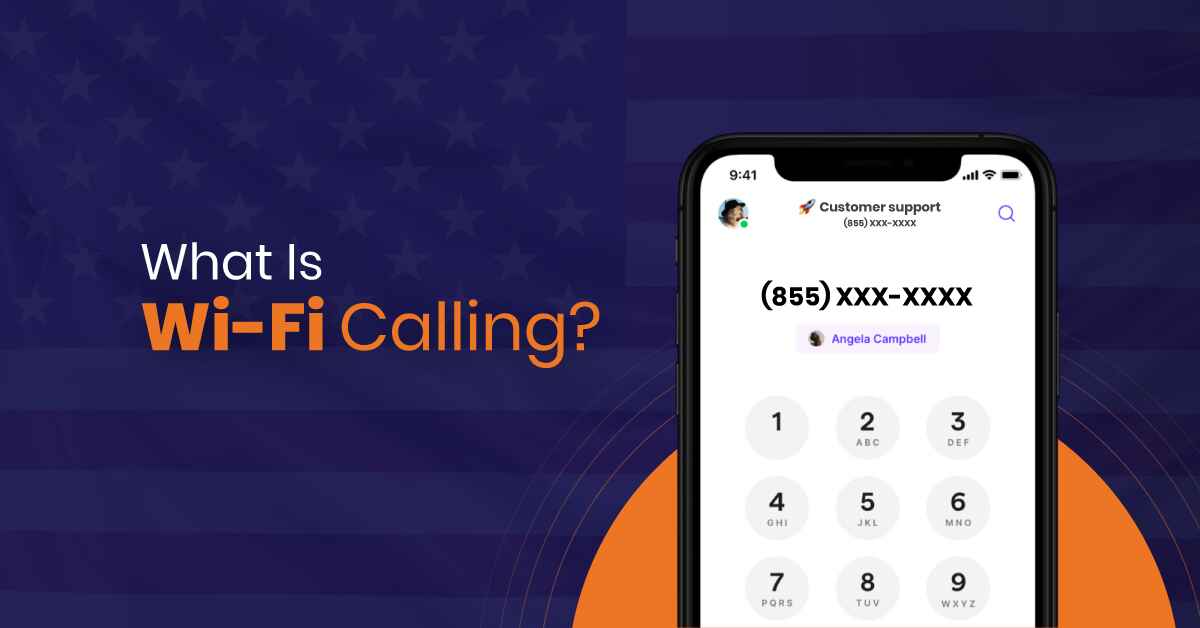How to Block All Spam Calls: Simple Guide for 2026

5 min read
Table of Contents
Spam calls are no longer a small inconvenience. In 2026, spam calls, scam calls, and telemarketing calls interrupt work, family time, and business operations every day. These unwanted calls often arrive from unknown numbers, use spoofed calls, or play a prerecorded or artificial voice to trick people into responding quickly.
At Vitel Global, we help individuals and businesses protect their phone numbers, reduce nuisance calls, and stop threats like identity theft caused by fraudulent callers. Blocking spam calls is no longer optional. It is a basic digital safety step.
This simple guide explains how to block all spam calls in 2026, silence unknown callers, filter incoming calls, and use smart call screening tools for both mobile phones and business systems.
What Are Spam Calls and Why Do They Still Happen
Spam calls are unsolicited calls you did not request. These include sales calls, political calls, fake government agency calls, and scam calls pretending to be banks or service providers. Many spam callers hide behind false caller ID information.
Caller ID spoofing allows spam callers to appear as legitimate calls or local numbers. This tricks people into answering incoming calls from unknown callers.
Spam callers target:
- Mobile phone numbers
- Wireless phone numbers
- Landline phone connections
- Business phone systems
Their goal is to collect personal details, steal money, or gain account access.
Why You Receive So Many Unwanted Calls
Your own phone number may appear online through forms, apps, or data leaks. Some legitimate telemarketers sell call lists, while scammers scrape public data.
If you answer unknown calls, scammers flag your number as active. This increases suspected spam calls over time.
Common reasons include:
- Not using built-in spam filters leaves phones exposed to repeated nuisance calls
- Ignoring the phone app’s settings prevents activating call blocking and silencing unknown callers
- Not registering with the national do-not-call list increases sales calls
- Allowing apps to access contacts shares phone numbers with unwanted callers frequently
Blocking calls early helps reduce spam calls long term.
How Spam Calls Threaten Personal Privacy
Spam calls are not just annoying interruptions. They are often the first step toward identity theft and financial fraud. Scam callers try to collect personal details such as names, addresses, bank information, and verification codes.
Once shared, this data can be reused across many platforms. Scammers may open fake accounts, reset passwords, or impersonate victims. Even one careless response can expose your own phone number to multiple spam caller networks.
Many spam calls pretend to come from a government agency, service provider, or bank. These callers sound urgent and pressure people to act quickly. This tactic increases mistakes and reduces caution.
Blocking spam calls early protects personal details and reduces long-term risk. Prevention is easier than recovering from identity theft.
How to Block All Spam Calls in 2026
1) Use Built-In Call Blocking Features
Most mobile devices include call blocking tools.
On iPhone
- Most mobile devices include built-in call blocking tools for spam protection.
- Open Settings to access phone features and call management options
- Tap Phone to view call settings and blocking controls
- Enable Silence Unknown Callers toggle to stop unknown numbers ringing
- Unknown callers go to voicemail while important calls remain visible
- Tap Phone, then Recents to view recent incoming calls
- Select the number and tap Block Contact to stop future calls
On Android Phones
- Open the Phone app to manage calls and spam settings
- Tap Settings to access call filtering and protection features
- Enable Filter spam calls to block suspected spam automatically
- Google Pixel phones include advanced spam filters for stronger call protection
Built-In Spam Filters vs Third-Party Call Blocking Apps
Most mobile devices now include built-in spam filters. These features work quietly in the background and block suspected spam calls automatically. They are easy to enable and do not require extra downloads.
However, built-in tools rely mainly on limited databases. Third-party apps often maintain larger spam databases and update them more frequently. This allows better detection of nuisance calls and spoofed calls.
Built-in filters work best for basic protection. Third-party apps add deeper call screening, call labeling, and reporting features.
Using both together creates a stronger call blocking system. Built-in tools stop obvious spam, while apps catch newer or suspicious calls.
2) Use Third-Party Call Blocking Apps
A third-party app adds extra protection.
Popular call blocking tools include:
- Truecaller
- Hiya
- Nomorobo
- Robokiller
These apps:
- Detect suspected spam
- Block blocking robocalls
- Label suspicious calls
- Screen the unknown callers list
3) Use Mobile Carrier Tools
Your service provider can block spam before calls reach your phone.
Examples include:
- T-Mobile Scam Shield
- Verizon Call Filter
- AT&T Active Armor
These mobile carrier tools stop most telemarketing calls at the network level.
4) Register With National Do-Not-Call Services
Registering your number helps stop legitimate telemarketers. It does not block illegal spam calls but reduces sales calls.
You can also report unwanted calls to the Federal Trade Commission.
5) Smart Call Screening for Businesses
Businesses face constant unwelcome calls that disrupt teams.
Vitel Global offers smart call screening with:
- Call control at the network level
- Blocking tools for spam callers
- Caller ID verification
- Filtering calls from unknown numbers
This ensures only legitimate calls reach employees.
Caller ID Spoofing Is More Advanced in 2026
Spam callers now use neighbor spoofing. Calls appear local even when they are not. This increases answer rates and scam success.
Using call screening, caller ID, and spam filters together is the best defense.
Why You Should Never Answer Unknown Calls
Answering unknown callers confirms your number is active. This leads to more unwanted callers and spam.
If you hear a prerecorded or artificial voice, hang up immediately. Never press keys or share details.
Always verify using the official number listed on a company website.
How Vitel Global Helps Stop Spam Calls
Vitel Global provides advanced call screening and blocking features for businesses.
Benefits include:
- Blocking spam calls before ringing
- Clear caller ID information
- Protection from spoofed calls
- Smart call routing
- Reduced interruptions
Teams stay focused while customers reach the right person.
Best Practices to Reduce Spam Calls Long-Term
Blocking spam calls works best when combined with smart habits. Technology helps, but user behavior also matters.
Follow these best practices consistently:
- Avoid sharing your phone number on public websites
- Do not answer calls from unknown numbers
- Never press keys during prerecorded messages
- Report unwanted calls to regulatory authorities
- Review phone app settings regularly for updates
- Limit app permissions that access contact lists
Over time, these actions reduce spam exposure. Scammers stop calling numbers that never respond. Silence and blocking are powerful signals.
Combining habits with blocking tools ensures long-term protection and cleaner communication.
Conclusion
Spam calls, scam calls, and unwanted callers will continue in 2026. The difference is how prepared you are. Using built-in spam filters, mobile carrier tools, call blocking apps, and smart call screening protects your phone number and peace of mind.
At Vitel Global, we help individuals and businesses block spam, protect communication, and keep only meaningful conversations flowing. Smarter call control today leads to safer communication tomorrow.
Take Control of Spam Calls in 2026
Stop spam calls early with smart screening that protects teams and customers.
Frequently Asked Questions
1. How do I block all spam calls on my mobile phone?
You can block spam calls using built-in features, third-party apps, mobile carrier tools, and call blocking settings. Combining multiple blocking tools works best to stop suspected spam calls and silence unknown callers.
2. Do call-blocking apps stop all unwanted calls?
No tool stops every spam call, but call-blocking apps reduce nuisance calls significantly. They block known spam numbers, identify suspicious calls, and filter incoming calls using large spam databases.
3. What is caller ID spoofing?
Caller ID spoofing is when spam callers fake their numbers to appear local or trusted. This makes calls look legitimate. Call screening tools detect spoofed calls and protect users from scams.
4. Can businesses stop spam calls completely?
Businesses cannot stop every spam call, but AI-based call screening reduces them drastically. Vitel Global blocks unwanted calls at the network level before employees answer.
5. Does call blocking affect important or emergency calls?
No. Emergency services and verified numbers still reach your phone. Call blocking tools are designed to filter spam while allowing important calls through safely.
Published: November 11th, 2025
Subscribe to Our Latest Updates
Get monthly product and feature updates, the latest industry news, and more!






